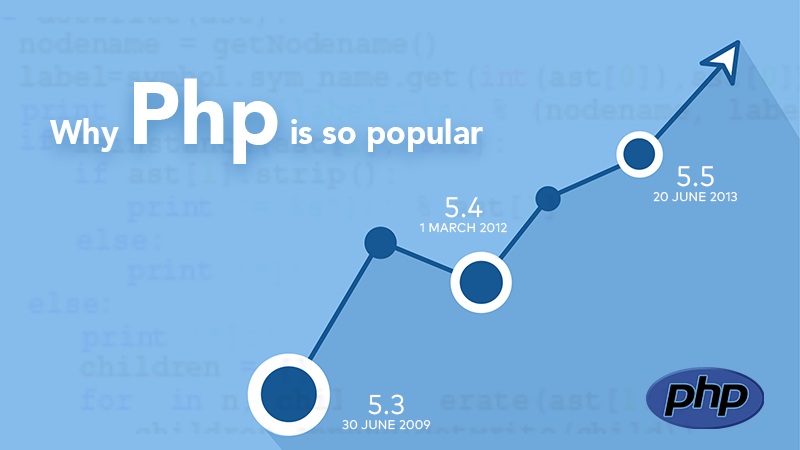Millions of websites developed and still counting. Do you think why PHP Web Development is so popular? Apart from these benefits like open source, free, there are a lot of other benefits of PHP which attracts developers & clients towards it.
So, let us take a look at some of the most important reasons why PHP is so popular.
Simplicity
PHP programming is just like composing an English article for the computer. Aside from the fact that the language is bits and bytes, It is compatible to be run on any system productively. Writing a PHP script is pretty straight forward and as opposed to another language. Thus programmers can write profoundly customized scripts.
Zero cost
PHP is an open source framework, meaning that it is free, handy and supported by loads of documentation. All of it makes PHP one of the savviest systems that have found its way into popular applications like Facebook, Twitter, Wikipedia, WordPress and more. Being open source also means that PHP is readily available for new developers who want to test their aptitude in coding.
Works exceptionally well with CMS
PHP makes scripting amoebic, allowing developers to change codes as and when they will. All PHP websites are fully customizable and can be transformed to meet the requirements of the customers with ease because Content Management Systems like WordPress, Drupal, Joomla and others are primarily based on PHP. Hence, developing or integrating a robust custom-made CMS solution with your website is simple.
Versatile
Any PHP code can be run on all significant platforms, allowing designers to coordinate the sites in its different stages. For businesses, this would mean cost effective utilisation of the current framework and work on platforms like UNIX, Linux, and Windows and further an extra support to integrate Apace and MySQL.
Flexible, measurable and effective
This is clearly understood from the fact that the biggest social network, Facebook, runs on PHP. The usefulness of PHP for such a dynamic platform has also led to the creation of “Hack”, a subordinate language, to meet the changing development needs. PHP doesn’t require a server reboot to be updated as opposed to other competing languages.
Extensions and other ad-ons
PHP is the most adaptable language in the field of web development. It allows designers to create and add more updated functionalities that keep the end users hooked. Further, extensions and plugins help new developers cope up with the programming challenges.
Large Community/Libraries
PHP is backed up by a huge library of resources and tutorials. Being open source, developers get to learn from users across the globe and this has been a defining reason why PHP is being adapted by every web developer today.
Some Interesting Statistics
- Usage of server-side programming languages for websites
This diagram shows the percentages of websites using various server-side programming languages.
- Historical trends in the usage of server-side programming languages for websites
This report shows the historical trends in the usage of server-side languages since January 2010.
- Usage of server-side programming languages broken down by ranking
This diagram shows the percentages of websites using various server-side programming languages broken down by ranking.
Knowledge thats worth delivered in your inbox








 Check out these articles to catch the latest trends in mobile apps:
Check out these articles to catch the latest trends in mobile apps: